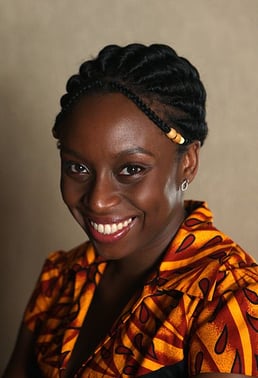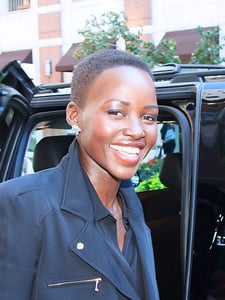Garnering more critical acclaim than many contemporary writers, Chimamanda Ngozi Adichie has already had one of her novels adapted to film with an all-star cast, and another is in the works. Are book-to-film adaptations all that we hope for when we love a novel? For instance, when we encounter a compelling text, is the power of the book enlivened or diminished on the silver screen? In recent years, a number of works of postcolonial fiction have been adapted for the cinema, such as Salman Rushdie’s Midnight’s Children and Monica Ali’s Brick Lane. In general, they haven’t done too well with critics or audiences. Can we expect something different from Adichie’s works when they hit theatres?
Adapting Half of a Yellow Sun
 |
| Chimamanda Ngozi Adichie: Courtesy of the John D. and Catherine T. MacArthur Foundation |
Given the role of colonial-era tensions at work in the Biafran War, and the lingering questions of race, ethnicity, and nation still at work in Nigeria today, Adichie’s novel provided a timely lens into the region’s past. Only a few years after the book’s release, rumors abounded that it would be adapted into a feature film. The film version, with the same title as the novel, would be written and directed by Biyi Bandele, a Nigerian newcomer to the American directorial scene.
The film premiered in 2013 at the Toronto International Film Festival starring Thandie Newton as Olanna and Chiwetel Elijifor, who earned much acclaim the same year for his work in the Oscar-winning film 12 Years a Slave, as Odenigbo. Although the movie received mixed reviews, one reviewer amelioratively noted the “heartfelt quality” that emerges both in the film and in Adichie’s novel. At the very least, the film received enough notice that another of Adichie’s novels soon became the focus of a second cinema adaptation.
Oscar Winner to Star in Americanah
 A story of two Nigerian immigrants who leave their country for the perceived freedoms of the West, Americanah garnered immediate acclaim upon its publication last year. And shortly thereafter, the Oscar winning-actress Lupita Nyong’o had already signed on to play one of the protagonists in a feature film adaptation of Adichie’s book.
A story of two Nigerian immigrants who leave their country for the perceived freedoms of the West, Americanah garnered immediate acclaim upon its publication last year. And shortly thereafter, the Oscar winning-actress Lupita Nyong’o had already signed on to play one of the protagonists in a feature film adaptation of Adichie’s book.
And Nyong’o won’t be the only star in the cast. To be sure, David Oyelowo, who received award nominations for his work in this past year’s film Selma, will be starring opposite the actress. Brad Pitt will be producing the movie, which is still in an early pre-production stage.
What do book-to-film adaptations ultimately bring to us that novels cannot? Depending on the work of fiction from which a movie arose, we might acquire access to new visualizations of our favorite scenes of fiction, or we might gain insight into scenes with complicated dialogue. But both texts — the novel and the film — should be treated as works of artistic engagement in their own rights. For with each novel and adapted screenplay, we’re seeing multiple subjectivities and interpretations at work. Luckily for us, we have some time to contemplate what a film adaptation of Americanah might look like, bringing our own ideas into the theatre with us once the movie hits world screens.









